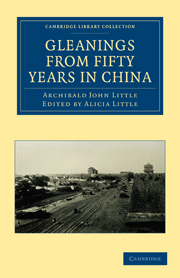Book contents
- Frontmatter
- FOREWORD
- EDITORIAL NOTE
- Contents
- PART I TRADE AND POLITICS
- WESTERN CHINA: ITS PRODUCTS AND TRADE
- BRITISH TRADE WITH CHINA
- EX ORIENTE LUX
- TWO CITIES: LONDON AND PEKING
- THE VALUE OF TIBET TO ENGLAND
- THE PARTITION OF CHINA
- HOW TO REGISTER YOUR TRADE MARK
- PART II TRAVEL
- PART III DRAMA AND LEGEND
- PART IV RELIGION AND PHILOSOPHY
- INDEX
- Plate section
BRITISH TRADE WITH CHINA
Published online by Cambridge University Press: 10 November 2010
- Frontmatter
- FOREWORD
- EDITORIAL NOTE
- Contents
- PART I TRADE AND POLITICS
- WESTERN CHINA: ITS PRODUCTS AND TRADE
- BRITISH TRADE WITH CHINA
- EX ORIENTE LUX
- TWO CITIES: LONDON AND PEKING
- THE VALUE OF TIBET TO ENGLAND
- THE PARTITION OF CHINA
- HOW TO REGISTER YOUR TRADE MARK
- PART II TRAVEL
- PART III DRAMA AND LEGEND
- PART IV RELIGION AND PHILOSOPHY
- INDEX
- Plate section
Summary
It is difficult for people who have not lived in China and travelled in the interior, away from the busy life of the Treaty Ports, to realise what the Chinese Empire is to-day—an enormous stretch of country larger than the whole of Europe, peopled by a dense population, most industrious and civilised, yet still living under conditions which vividly recall the descriptions of our own Middle Ages.
Few people realise upon what a democratic and decentralised basis the Chinese Empire stands. The Central Government at Peking may exercise despotic sway over its own appointed officials, but it dares not touch the people at large, who have their own ideas of self-government consecrated by centuries of “custom.” This unwritten law goes ever unchallenged, while the codified law is more often than not a dead letter. Theoretically the local magistrate, the appointee of the provincial viceroy, and so the officer of an infallible Emperor, is absolute; in practice his powers are extremely limited. The fact of his having no armed force at his back prevents his issuing any decree not in accord with the public opinion of the citizens he is supposed to rule over; should he attempt anything of the kind, he is soon made to withdraw by public demonstrations of discontent, which never fail ultimately to bring him into line with the popular will; and he will go great lengths in evading disagreeable instructions from above, rather than expose himself to humiliation from below.
- Type
- Chapter
- Information
- Gleanings from Fifty Years in China , pp. 39 - 50Publisher: Cambridge University PressPrint publication year: 2010First published in: 1910

